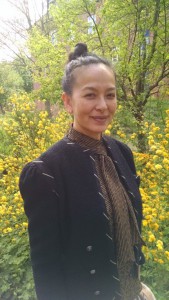By Maryann Henck, Maria Moss, and Sabrina Völz

When lê thi diem thúy (pronounced “twee”) visited Leuphana University this past May, not only did our students have the opportunity to attend her reading and talk, the three of us also had the pleasure of interviewing her. lê thi diem thúy is the author of the highly acclaimed novel, The Gangster We Are All Looking For, but primarily sees herself as a poet. If you’re looking for some creative inspiration to start off the new year, take a peek at the interview.
ASB: When did you first decide to become a writer?
thúy: It was never decided that I would become a writer. What I wanted, ever since I was a child and first learned to read, was to be with words. Reading was both a challenge and a consolation, stories were worlds I could enter, and from a young age I understood that words somehow summoned worlds. At first I only wanted to be transported as a reader. Perhaps I became a writer when I realized that I, too, carried worlds within myself, and words were the key to unlock those worlds and release people, places, moments, questions, desires.
ASB: Where do you get your inspiration from?
thúy: What moves me, what I don’t understand, what torments me, what humbles me, what eludes me in its beauty, mystery, ferocity.
ASB: During your reading at Leuphana University we heard you say, “Art comes out of desire in the face of indifference.” Could you please comment on that statement.
thúy: I believe art comes out of a wholly subjective desire to capture or convey something that has urgency for the artist – and almost no one else. I don’t mean the questions that drive my work aren’t of interest to others, I only mean that in the making of the work, I alone am moved by the desire to get closer and summon something onto the page. I take responsibility for this desire, as if it were a haunting that only stuns and stops me in my tracks. The teeming world moves on, as it does, as it should. I welcome and I understand that I work in the face of its profound indifference. No one and no thing asks, and yet I insist on making these marks which, through character, the tension of a sentence, the evocation of time and place, are marks of my own desire to engage with the world.
ASB: What would you call yourself – a Vietnamese American writer, an American writer of Vietnamese descent, or an American writer?
thúy: I am a writer. I work with words.
ASB: What is the relationship of your writing to your own biography?
thúy: If I had not left Vietnam at the age of six, as a refugee, a boat child, and experienced the deep fracturing of my own family which is to say, at that age, my entire world
If I had not had to learn English quickly and under great pressure
If I had not, in the act of trying, as a child, to translate for my father, while being aware that I could answer certain questions on his behalf (name, address, date of birth, etc.) but in no way convey his joy or sorrow, the worlds he had lost and been forced by the knife-edge of history to leap over
If my own experience of the roundness of the world had not shown up the lie and utter inadequacy of the linear answer or explanation
If the war
If its long aftermath
If I wasn’t a girl who could not stop asking questions and believed that somewhere there were not answers to these questions, but even greater, more tangled, more worthy questions
If I had not been forced to leave Vietnam, I would not have had to find a way – through words – to first return myself to myself and then – through words – pull the worlds I carried onto the shore of the page here in America.
ASB: Thank you for not only answering our questions, but also allowing us a glimpse into your poetic process.
23,853 Total Views, 5 Views Today






